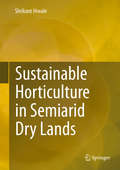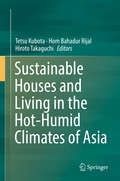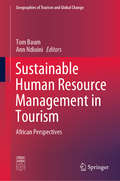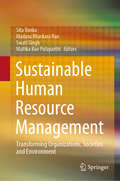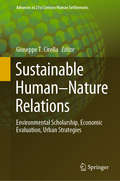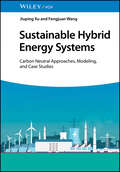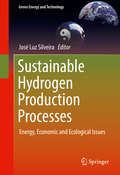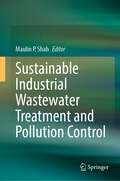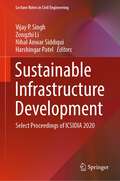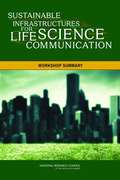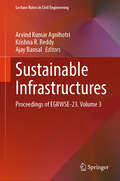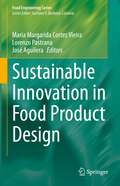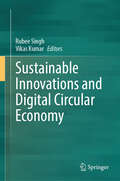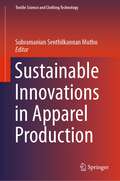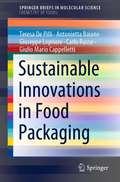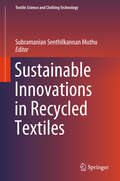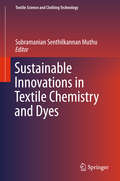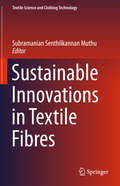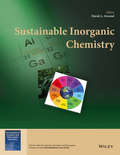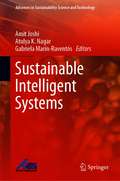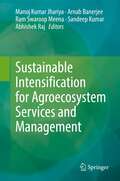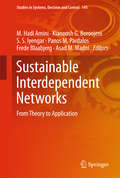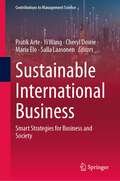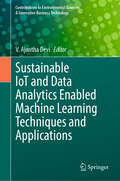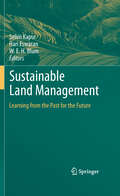- Table View
- List View
Sustainable Horticulture in Semiarid Dry Lands
by Shrikant HiwaleThis book discusses ways of increasing production/unit area by making full use of the soil and water under the harsh climatic conditions of semiarid areas. This leads to improved sustainability, increased availability of fresh produce, which is vital for human health and higher incomes for small and marginal farmers. Arid and semiarid areas account for almost 70 per cent of the total cropped area of India. In these areas physical constraints like low and erratic rainfall, high temperature, high wind velocity, low fertility, poor soil structure, salinity of soil and ground water all limit reliable crop production. In the absence of any type of aggregation, the soils are highly erodible, lack structure and have a very coarse in texture with low water holding capacity. Intensive agricultural practices, increasing population pressure, climatic changes, environmental pollution, loss of biodiversity, soil erosion, salinization and water depletion are all threatening the sustainability of agriculture. In view of the mounting demand for food, it is vital to link enhanced food production with nutritional security, conservation of natural resources, increasing farmers' incomes, employment generation through agricultural diversification. Horticulture, particularly of fruit trees, can play a major role in solving the problem of nutrition, as fruits are rich source of vitamins and minerals and have antioxidant properties. Fruit trees, which are mostly deciduous, add leaf litter to the soil, and this ultimately helps to improve the condition of the soil. In addition, fruit trees are known to reduce soil erosion and reduce run off. The trees also play a major role in purifying the environment as they are the known carbon sequesters. Fruit-tree cultivation is a profitable preposition. There is no scope to increase the land surface; all increase in productivity therefore has to be from the available land. This means introducing cropping systems that can meet the basic food, fodder and fuel requirement of farming families.
Sustainable Houses and Living in the Hot-Humid Climates of Asia
by Tetsu Kubota Hom Bahadur Rijal Hiroto TakaguchiThis book provides information on the latest research findings that are useful in the context of designing sustainable houses and living in rapidly growing Asian cities. The book is composed of seven parts, comprising a total of 50 chapters written by 53 authors from various countries, mainly in the Asian region. Part I introduces vernacular houses in different Asian countries such as Indonesia, Malaysia, India, Nepal, China, Thailand and Laos. Parts II and III then explore in depth indoor adaptive thermal comfort and occupants’ adaptive behavior, focusing especially on those in hot-humid climates. Part IV presents detailed survey results on household energy consumption in various tropical Asian cities, while Part V analyses the indoor thermal conditions in both traditional houses and modern houses in these countries. Several real-world sustainable housing practices in Asian cities are reviewed in the following part. The final part then discusses the vulnerability of expanding Asian cities to climate change and urban heat island. Today, approximately 35-40% of global energy is consumed in Asia, and this percentage is expected to rise further. Energy consumption has increased, particularly in the residential sector, in line with the rapid rise of the middle class. The majority of growing Asian cities are located in hot and humid climate regions, and as such there is an urgent need for designers to provide healthy and comfortable indoor environments that do not consume non-renewable energy or resources excessively. This book is essential reading for anyone with an interest in sustainable house design in the growing cities of Asia.
Sustainable Human Resource Management in Tourism: African Perspectives (Geographies of Tourism and Global Change)
by Tom Baum Ann NdiuiniThis book addresses the application of sustainable HRM principles within tourism in the specific context of Africa, a neglected area of study. It draws on diverse aspects of HRM, from the micro- (individual) through the meso-level (organisational) to the macro-level (policy, governmental). It also reflects the diverse challenges facing a critical area within emerging African tourism, that of its workforce. The book is substantially research-based and provides a state-of-the-art picture of emergent studies in this area, drawing on case examples from a wide-range of African contexts. As such, it provides a comprehensive resource and starts discussion in an emergent research area.
Sustainable Human Resource Management: Transforming Organizations, Societies and Environment
by Sita Vanka Madasu Bhaskara Rao Swati Singh Mallika Rao PulaparthiThis book provides a multi-stakeholder perspective on sustainable HRM for the policymakers, managers and academics, addressing issues, approaches, research studies/frameworks and emerging patterns relating to the subject. It discusses various aspects of sustainability, such as making HR more responsible for ensuring sustainability focusing on the triple bottom line, characteristics of sustainable HRM, psychological contracts, emotional intelligence, and psychological capital. The book also explores organizational citizenship behavior, employment relations, employee engagement, sustainable leadership, disruptive HR practices, sustaining employee motivation, educational sustainability, sustainable career management, sustainable environment, employer and employee branding, sustainable organizations, organization culture, training for sustainability, sustainable employee performance, business sustainability and sustainable employability. It provides an update on the concept, processes, issues and emerging paradigms from multidimensional and cross-country perspectives to showcase sustainable HR practices, and appeals to the academics, practitioners and policymakers in the area of HRM.
Sustainable Human–Nature Relations: Environmental Scholarship, Economic Evaluation, Urban Strategies (Advances in 21st Century Human Settlements)
by Giuseppe T. CirellaThis book addresses sustainability thinking and the bigger picture, by taking into consideration how and from where contemporary schools of thought emerged approximately a quarter-century ago. Evidence from the literature illustrates a number of key concepts and techniques that have been tested and continue to be tested, within various multi-disciplinary fields, on societal functionality. Research into sustainable societies needs to be sound, ethical, and creative. A cross-sectoral, interdisciplinary examination of challenges and strategies is used to interlink sustainability thinking and human-nature relations. With an ever-growing number of people now concentrated within urban areas, providing not only environmental quality and livable space, but also security and resilient urban systems, is becoming increasingly important. This urbanization trend has overlapped with environmental degradation, consumption of natural resources, habitat loss, and overall ecosystem change. Consequently, the goal is for cleaner, safer societies – with higher standards of living – to excel in support of current and future generational communities. The book tackles these challenges by integrating environmental scholarship, economic evaluation, and urban strategies under one umbrella of thought. The relational paradigms presented include examples that correlate developed and developing countries, socioeconomics and community development, and governance of knowledge and education. As such, the book argues, furthering of knowhow should be accessible and shared in order to achieve maximum innovation and benefit. Sustainability thinking, after all, is a metric for intrinsic human-nature relations in terms of past performance, present development, and future goals. This book discusses this metric and offers novel approaches to growing societies and what we can do next.
Sustainable Hybrid Energy Systems: Carbon Neutral Approaches, Modeling, and Case Studies
by Jiuping Xu Fengjuan WangSustainable Hybrid Energy Systems Discovering comprehensive approaches to build sustainable hybrid energy systems Hybridization is the eternal theme of human energy utilization. However, it has never been more important than it is now because of the urgency of promoting energy transition and achieving carbon neutrality. Therefore, exploring the design, combustion, operation, and policy challenges of sustainable hybrid energy systems becomes increasingly important. Sustainable Hybrid Energy Systems: Carbon Neutral Approaches, Modeling, and Case Studies provides a detailed explanation of these aspects. Dividing hybrid energy systems into three categories—co-located, co-combusted, and co-operated, this book emphasizes the deployment optimization, emission quota allocation, scheduling coordination, and renewable portfolio standards implementation of these systems. The results are essential tools for understanding the current and future of multi-input single-output hybrid energy systems. Sustainable Hybrid Energy Systems readers will also find: Clear logical framework that reveals the constitutes of hybrid energy systems.Systematic technical scheme for building an economic, environmental, flexible, and resilient future energy system.Extensive case studies from single power plant level, multiple power plant level, and grid level.Effective guidelines for wider application of the proposed carbon neutral approaches. Sustainable Hybrid Energy Systems is ideal for power engineers, electrical engineers, scientists in industry, and environmental researchers looking to understand these energy solutions. It will also provide collectible value for libraries.
Sustainable Hydrogen Production Processes
by José Luz SilveiraThis work presents a comprehensive investigation of the most significant renewable hydrogen production processes. Technical, economic and ecological studies are described for the processes of steam reforming of ethanol, natural gas and biogas; water electrolysis with energy from renewable sources (wind power, photovoltaic and hydroelectric), and hydrogen production using algae. Aimed at mechanical and chemical engineering graduate students and researchers involved in environmental sciences, sustainable energy and bioenergy research, this book introduces readers to the latest developments in the field and provides essential reference material for future research. The book first presents a comprehensive literature review of the processes studied. Subsequently, it provides a technical report on assessing the energetic efficiency for each hydrogen production process, as well as an economic study of the respective hydrogen production costs. Lastly, the ecological efficiency of each process is addressed. Over the past few decades, the UNESP's Group of Optimization of Energetic Systems, headed by Professor Jos#65533; Luz Silveira, has been pursuing research in the field of renewable energy generation. A major part of the group's research focuses on the production of hydrogen as a fuel and its important contribution to mitigating the environmental impacts caused by pollutant emissions.
Sustainable Industrial Wastewater Treatment and Pollution Control
by Maulin P. ShahThis book summarizes the advanced sustainable trends in removing toxic pollutants by environmental and biotechnological processes from both industrial wastewater and sewage wastewater. The book also provides an assessment of the potential application of several existing wastewater bioremediation techniques and introduces new cutting-edge technologies. Among other valuable information covered, here are the methods, procedures, materials (especially low-cost materials originating from industrial and agricultural waste), management of wastewater containing toxic pollutants, and valorization possibilities of waste resulting from the removal of toxic pollutants from wastewater.Tonnes of hazardous waste pollutants released by industries are a challenge worldwide. With the ever-growing population and shrinking landfill areas, managing the disposal of pollutants is a matter of severe concern. Industrial wastewater treatment, recycling, and reuse are serious issues in today’s context, not just to protect the environment from pollution, but also to conserve water resources so that water stress is reduced.This book is designed for engineers, scientists, and other professionals and serves as a good summary of the current state-of-the-art and innovative research challenges to control pollution for coming generations.
Sustainable Infrastructure Development: Select Proceedings of ICSIDIA 2020 (Lecture Notes in Civil Engineering #199)
by Vijay P. Singh Zongzhi Li Nihal Anwar Siddiqui Harshingar PatelThis book presents the select proceedings of the International Conference on Sustainable Infrastructure Development: Innovations and Advances (SIDIA 2020). The book addresses the issues of optimal resource allocation and utilization, construction cost minimization, budget optimization for infrastructure development in hilly terrain as well as plains, to ensure quality and safety with minimal environmental impact. The topics covered include planning, design and construction of sustainable infrastructure projects, policy and practices to be considered for the comprehensive development which is socially inclusive specifically in developing nations, transportation engineering and management which is performance-based and emerging economical models for partnerships, environment engineering and management for ascertaining the best methods for environmental impacts assessment to capture the true indirect costs of a infrastructure project, geotechnical and water resource engineering using new developments, and utilizing the various technological impacts for ensuring disaster preparedness of any region. This book can prove to be useful for beginners, researchers, and professionals interested in the latest advances and innovations in sustainable infrastructure development.
Sustainable Infrastructures for Life Science Communication
by Elizabeth Stallman BrownAdvances in the life sciences - from the human genome to biotechnology to personalized medicine and sustainable communities - have profound implications for the well-being of society and the natural world. Improved public understanding of such scientific advances has the potential to benefit both individuals and society through enhanced quality of life and environmental protection, improved K-12 and undergraduate science education, greater understanding of human connections to the natural world, and more sustainable policies and regulations. Yet few systems of support exist to help life scientist communicators share their research with a broad range of public audiences, or engage the public in discussions about their work. "Sustainable Infrastructures for Life Science Communication" is the summary of a two-part workshop convened in December 2013 and January 2014 by the National Research Council Roundtable on Public Interfaces of the Life Sciences to identify infrastructure-related barriers that inhibit or prohibit life scientists from communicating about their work and characteristics of infrastructure that facilitate or encourage scientists to engage with public audiences. The workshop featured both formal presentations and panel discussions among participants from academia, industry, journalism, the federal government, and nonprofit organizations. The presentations highlighted the motivations of and challenges to life scientist communicators, theoretical approaches to science communication, examples of different types of infrastructure to support science communication, and the need for building more sustainable science communication infrastructures. This report considers communication infrastructure across a range of life science institutions, including federal agencies, academia, industry, and nonprofit organizations and explores novel approaches to facilitate effective science communication.
Sustainable Infrastructures: Proceedings of EGRWSE-23, Volume 3 (Lecture Notes in Civil Engineering #355)
by Krishna R. Reddy Arvind Kumar Agnihotri Ajay BansalThis book contains peer-reviewed and selected papers presented during the International Conference on Environmental Geotechnology, Recycled Waste Materials and Sustainable Engineering (EGRWSE) 2023, held at NIT Jalandhar. It discusses the recent innovations, trends, concerns, practical challenges encountered, and the solutions adopted in waste management and engineering, geotechnical and geoenvironmental engineering, infrastructure engineering and sustainable engineering. This book can serve as a useful resource for researchers, educators, policymakers, and professionals working in the field of civil engineering, chemical engineering, environmental sciences, and public policy.
Sustainable Innovation in Food Product Design (Food Engineering Series)
by Maria Margarida Cortez Vieira Lorenzo Pastrana José AguileraThis book comes out of the 12th Iberoamerican Congress of Food Engineering, which took place at the University of Algarve in Faro, Portugal in July 2019. It includes the editors' selection of the best research works from oral and poster presentations delivered at the conference. The first section is dedicated to research carried out on SUSTAINABLE ALTERNATIVES TO CHEMICAL ADDITIVES TO EXTEND SHELF LIFE, with special emphasis on animal products. The second section discusses recent research in SUSTAINABLE NEW PRODUCT DEVELOPMENT. The third section delves into the development of PLANT-BASED ALTERNATIVES TO DAIRY AND GLUTEN BASED CEREALS. The fourth section tackles CONSUMER BEHAVIOR regarding food products with new sources of protein (e.g. insects) or new sources of important nutrients (e.g. seaweeds) and the fifth discusses the VALORIZATION OF BY-PRODUCTS IN THE FOOD INDUSTRY (from fruits and wine making). For food engineers, food technologists, and food scientists looking to stay up-to-date in this field of sustainable food engineering, Sustainable Innovation in Food Product Design is the ideal resource.
Sustainable Innovations and Digital Circular Economy
by Vikas Kumar Rubee SinghThis book explores how circular economy can be applied globally, and what its reshaping potential could prove for industries, communities, and for our lives in future. It discusses how the concept of a circular economy offers an innovative and transformative approach that not only mitigates the negative impacts of traditional linear models, but also unlocks a vast potential for growth and social progress that is underutilized. In order to achieve the objectives of this book, the design and conceptualization have been based on the advantages, as well as the commitment of digital circular economy to maintain environmental sustainability as per the SDGs. With the goal of inspiring readers and policymakers alike to adopt sustainable practices and drive positive change for their respective industries, this book presents to the readers and policymakers the possibilities of sustainable practices. Additionally, it describes how embracing a digital circular economy can reduce waste, increase resource efficiency, and make the economy more resilient and regenerative. Providing practical examples and policy recommendations along with a strategic roadmap, this book provides useful insights and support in defining a path to a more sustainable future.
Sustainable Innovations in Apparel Production (Textile Science And Clothing Technology Ser.)
by Subramanian Senthilkannan MuthuThere have been a lot of innovations in making the garment or apparel production sector sustainable. This book highlights sustainable innovations in the apparel production sector, which is the final destination in the textile production segment. Measuring sustainability in clothing is one of the inevitable areas to deal with when it comes to sustainable apparel production, which is also highlighted here.
Sustainable Innovations in Food Packaging (SpringerBriefs in Molecular Science)
by Carlo Russo Teresa De Pilli Antonietta Baiano Giuseppe Lopriore Giulio Mario CappellettiThis book explores the latest advances in the sustainable production of packaged foods. Packaging plays an important role in sustainable food production and consumption in industrialized countries, where there is an increasing pressure to reduce the environmental impact of packaged foods. For example, the European Union recommends packaging from renewable sources, with a focus on bio-based materials. Sustainable packaging processes guarantee the reuse of the entire waste material and at the same time avoid the loss of food safety and quality during storage by preventing food-borne diseases and chemical contamination. Furthermore, the dramatic problem of plastic waste accumulation and the conservation of oil and food resources need to be taken into consideration. This book presents eco-friendly packaging strategies to reduce food and plastic waste and address the end-of-life issues of persistent materials. It particularly focuses on the production of biodegradable microbial polymers and the use of by-products and waste from the agricultural and food industries. These strategies promote an innovative and productive waste-based food packaging economy, separating the food packaging industry from fossil reserves and allowing bio-polymers to return to the soil. Lastly, the book covers life-cycle assessment, life-cycle costing, and externality assessment to help readers understand the economical reliability of the innovations presented.
Sustainable Innovations in Recycled Textiles (Textile Science And Clothing Technology Ser.)
by Subramanian Senthilkannan MuthuThis book highlights the environmental and economic benefits of recycling in textiles and fashion; vis-a-vis virgin textiles. Recycling plays an inevitable part when it comes to sustainable innovations in textiles and fashion sector. As basic information pertaining to the benefits, challenges of recycling in textiles are discussed to the sufficient extent in the literature, this book deals with the innovative at the same time, sustainable products made from the recycled textiles.
Sustainable Innovations in Textile Chemistry and Dyes (Textile Science And Clothing Technology Ser.)
by Subramanian Senthilkannan MuthuThis book details two elements of textile chemistry namely- sustainable/eco-friendly dyes and green chemistry. It presents latest topics in sustainable dyeing techniques, low impact dyeing methods, wool dyeing techniques and green chemistry. Certain case studies are also highlighted.
Sustainable Innovations in Textile Fibres (Textile Science And Clothing Technology Ser.)
by Subramanian Senthilkannan MuthuThis book highlights the innovations in textile fibres, that is the starting point of the supply chain. There are numerous innovations made in terms of making the existing fibres sustainable and also to discover new sustainable fibres. This book deals with those innovative sustainable textile fibres in detail. It also presents an overview of various current textile fibres, their issues associated with sustainability and how new, sustainable fibres overcome those issues. Finally it discusses the challenges and implications of these sustainable fibres on technical and economic fronts.
Sustainable Inorganic Chemistry (EIC Books)
by David A. AtwoodThe Earth's natural resources are finite and easily compromised by contamination from industrial chemicals and byproducts from the degradation of consumer products. The growing field of green and sustainable chemistry seeks to address this through the development of products and processes that are environmentally benign while remaining economically viable. Inorganic chemistry plays a critical role in this endeavor in areas such as resource extraction and isolation, renewable energy, catalytic processes, waste minimization and avoidance, and renewable industrial feedstocks. Sustainable Inorganic Chemistry presents a comprehensive overview of the many new developments taking place in this rapidly expanding field, in articles that discuss fundamental concepts alongside cutting-edge developments and applications. The volume includes educational reviews from leading scientists on a broad range of topics including: inorganic resources, sustainable synthetic methods, alternative reaction conditions, heterogeneous catalysis, photocatalysis, sustainable nanomaterials, renewable and clean fuels, water treatment and remediation, waste valorization and life cycle sustainability assessment.The content from this book will be added online to the Encyclopedia of Inorganic and Bioinorganic Chemistry.
Sustainable Intelligent Systems (Advances in Sustainability Science and Technology)
by Amit Joshi Atulya K. Nagar Gabriela Marín-RaventósThis book discusses issues related to ICT, intelligent systems, data science, AI, machine learning, sustainable development and overall their impacts on sustainability. It provides an overview of the technologies of future. The book also discusses novel intelligent algorithms and their applications to move from a data-centric world to sustainable world. It includes research paradigms on sustainable development goals and societal impacts. The book provides an overview of cutting-edge techniques toward sustainability and ideas to help researchers who want to understand the challenges and opportunities of using smart management perspective for sustainable society. It serves as a reference to wide ranges of readers from computer science, data analysts, AI technocrats and management researchers.
Sustainable Intensification for Agroecosystem Services and Management
by Sandeep Kumar Ram Swaroop Meena Manoj Kumar Jhariya Arnab Banerjee Abhishek RajThis edited book provides a comprehensive account of the sustainable intensification process through various forms of case studies and scientific approaches studied across the globe. It also focuses on the agroecosystem services and their subsequent management for ecological integrity. The book helps to understand the interconnection of food, nutrition, economic growth, and environmental security on the planet. It provides comprehensive information with photographic illustration and various other forms of scientific databases on sustainable intensification of agroecosystems. The book also supports decision-making, strategies, and policy formulation for effective implementation of sustainable intensification towards higher productivity along with maintenance and management of agroecosystem services. Proper sustainable intensification of agroecosystem services and their management by maintaining ecological harmony is the future prospect for sustainable development. High input agriculture gives rise to a high-energy footprint, agricultural pollution, resource depletion, loss of agro-biodiversity, and decline of human health. Through this connection, the sustainable intensification approach addresses the advanced food security, sustainability, and overall prosperity of humankind. The book is helpful for both undergraduate and postgraduate students, policymakers, the farming community, as well as the scientific community across the globe to understand the concept of sustainable intensification and its application in relevant fields for proper management of agroecosystems services.
Sustainable Interdependent Networks: From Theory To Application (Studies In Systems, Decision And Control #145)
by Panos M. Pardalos Frede Blaabjerg Kianoosh G. Boroojeni M. Hadi Amini S. S. Iyengar Asad M. MadniThis book focuses on the theory and application of interdependent networks. The contributors consider the influential networks including power and energy networks, transportation networks, and social networks. The first part of the book provides the next generation sustainability framework as well as a comprehensive introduction of smart cities with special emphasis on energy, communication, data analytics and transportation. The second part offers solutions to performance and security challenges of developing interdependent networks in terms of networked control systems, scalable computation platforms, and dynamic social networks. The third part examines the role of electric vehicles in the future of sustainable interdependent networks. The fourth and last part of this volume addresses the promises of control and management techniques for the future power grids.
Sustainable International Business: Smart Strategies for Business and Society (Contributions to Management Science)
by Yi Wang Maria Elo Pratik Arte Cheryl Dowie Salla LaasonenThis is a unique book that adopts a global approach to studying international business. It stimulates research and rethinking among scholars and practitioners to understand how businesses operate internationally into lucrative markets, and their role in sustainable business growth, glocal value creation, and economic development. It provides insights into how international firms, entrepreneurs, family businesses, and other stakeholders balance the act of value creation and conducting sustainable and ethical business. The book covers economic, social, and environmental dimensions of sustainability such as poverty alleviation through FDI and remittances, diversity and inclusion in management, and ethical governance to value creation for stakeholders and profit maximization through sustainable firm growth, entrepreneurial initiatives, and sustainable business models. It addresses capacity building and the grand challenges that international business needs to develop solutions for. The chapters offer multiple types of contributions including conceptual and theoretical works, literature reviews, and empirical (qualitative and quantitative) studies. The authors, and the topics included, provide a wide international representation and illustrate multi-layered sustainable business perspectives that cover developing, emerging, and developed country contexts as well as multiple directions of international business flows.
Sustainable IoT and Data Analytics Enabled Machine Learning Techniques and Applications (Contributions to Environmental Sciences & Innovative Business Technology)
by V. Ajantha DeviThis book provides a structured presentation of machine learning related to vision, speech, and natural language processing. It addresses the tools, techniques, and challenges of machine learning algorithm implementation, computation time, and the complexity of reasoning and modeling of different types of data. The book covers diverse topics such as semantic image segmentation, deep visual residual abstraction, brain–computer interfaces, natural language processing, traffic and signaling, driverless driving, and radiology. The majority of smart applications have a need for a sustainable Internet of things (IoT) and artificial intelligence. Active research trends and future directions of machine learning under big data analytics are also discussed. Machine learning is a class of artificial neural networks that have become dominant in various computer vision tasks, attracting interest across a variety of domains as they are a type of deep neural networks efficient in extracting meaningful information from visual imagery.
Sustainable Land Management
by Selim Kapur Hari Eswaran Winfried E.H. BlumSoil quality is threatened by many human-induced activities, but can also be improved by good land management. In the relatively short history of mankind on earth, the landscape and soils of the world have been drastically modified from their "natural " state. Landscapes altered by man's activities are termed "Anthroscapes" which are inextricably linked to culture and history. The challenges for today's scientists are to devise and implement sustainable land management strategies in order to preserve the land for the benefit of future generations. This book is a valuable compendium of the research experiences so far gained in studies of the context and concept of the "Anthroscape" and highlights the potential future contributions of such research to sustainable development.
